#BUT ALSO I COULD SEE HOW BOTH COULD BE USEFUL/HELPFUL IN DIFF. SITUATIONS/TO DIFF. AUDIENCES.
Explore tagged Tumblr posts
Text
RE: "HAVE ANOTHER THING/THINK COMING," FROM MERRIAM WEBSTER: "Both expressions are used to tell a person that they're wrong and should consider changing their mind." (LINKS TO MORE INFO ABOUT IT IF YOU'RE CURIOUS!)
ALSO TO HELP WITH BREATHE VS BREATH:
"BREATHE" WHEN SAID OUT LOUD IS THE ONE THAT HAS THE EEEEEE SOUND IN THE MIDDLE, AND YOU CAN REMEMBER WHICH IS WHICH BECAUSE "BREATHE" HAS THE EXTRA E.
"BREATH" ENDS WITH THE "TH" SOUND YOU'RE MORE FAMILIAR WITH AND RHYMES WITH DEATH.
IT’S NOT ‘PEEKED’ MY INTEREST
OR ‘PEAKED’
BUT PIQUED
‘PIQUED MY INTEREST’
THIS HAS BEEN A CAPSLOCK PSA
#ALSO I WOULD JUST LIKE TO SAY THAT I DON'T LOVE THE ANGRY TONE OF THIS POST. SOME OF IT IS COMING FROM THE CAPS LOCK NATURE#BUT SOME OF IT IS ALSO FROM THE WORD CHOICE AND I JUST WANT TO SAY THAT I DONT CO-SIGN THAT PART OF IT BY REBLOGGING IT.#EVERYONE KNOWS SOMETHING THAT OTHER PEOPLE DONT KNOW AND EVERYONE DOESNT KNOW SOMETHING THAT OTHER PEOPLE KNOW AND IT'S ALL GOOD.#I WOULD ALSO ARGUE WITH SIKE VS PSYCH BECAUSE IT'S SLANG ANYWAY BUT ALSO I DO LIKE HOW 'PSYCH' KEEPS THE ORIGIN OD THE PHRASE IT COMES FROM#*OF#BUT ALSO I COULD SEE HOW BOTH COULD BE USEFUL/HELPFUL IN DIFF. SITUATIONS/TO DIFF. AUDIENCES.#I ALSO KINDA FEEL SAD THAT SOME PEOPLE WHO HAVE SPELLING/READING CHALLENGES MIGHT FIND THIS POST HARD TO READ WITH ALL THE CAPS IM SO SORRY#But i do know there are other posts out there like this#im pretty sure. with less frustration baked in.#the think/thing one almost made me loose my mind it almost rocked my entire fucking world.#i mean. it DID rock my world because i absolutely 100% thought it was 'thing'#and that 'think' was one of the most unhinged opinions i had ever heard.#the first time i'd ever even heard it with 'think' was from bea casely from arden (podcast) and it was SO FUCKING FUNNY coming from her#and the way brenda responded.... just so fucking perfect.#so now knowing that it CAN be both.... it just.... wow it just changes the whole fucking thing.#linguistics
689K notes
·
View notes
Note
Hi read your post, D is diff in s3 but that is because she is struggling with all whats happened. 3.01 she was so sad ,then after Roscoff she was annoyed with him,he says one thing and does another,Dwight was his friend ,yes he had to go but one min he wants to be a country squire and next he in France. She gets snarky with him because he is stubborn
(2/5) She knows what he wants before he does,he is blind to things, she deserves to be snarky after what he put her through ,it took him months to say sorry,now he is saying twice, you have married the wrong man, look else where,not all men are besottted, he cant see what L is really like,says she wouldnt allow G to behave bad, he knows L, (yes thats the prob). Know D knows he kissed L, would that sound good to a 25 yr old girl, she ought to hang the moon for R now and he still didnt change
(3/5) He cant see that she is more vunerable now things that never bothered her before do now, she has lost her faith in him and herself,chink in her armour, she has been second best for most of her marriage . She has never had his unconditional love, he loves her but he just needed to show it more,one dance at the ball,tell her she looks nice, she doubts her self worth ,he is not honest with her,she feels unappreciated.he is s good man but takes her for granted, so yes glad she is modern
(4/5)He would walk all over her otherwise, think she deserved to be snarky with him at times ,didnt like the beach snark after Agatha died,he retaliated bad back as well, she knows that R should do this job not G,he knows it,it annoys her, agree that some dialogue from book D does not suit show D that gets mixed up, book D would not of suited todays audience,she was too forgiving after his vbt, then when with H while she was still happy with R, that was horrible,glad Deb changed that. D was sweet in
(5/5)She was sweet in s1 but she was young and blinded with love,she no longer sees him with rose rimmed spectacles, she had him on a pedestal . Circumstances have changed her. Going with H was wrong because of her beliefs but he is the first man thats loved her because he wants to,R married her out of obligation,Sparks helped me with understanding all this. Thats my take anyway,
Okay, Nonny. Since your ask was long, I’m going to try and tackle this the best I can. This answer will probably be long, too. Here goes:
This is my take. Modern Demelza does not work in the show because they gave her 21st Century attitudes, but left everyone else in the 18th century. This is a period drama. It is not unreasonable to expect that the characters and the story are accurate to the time period. If modern people can’t accept that this is a period drama and that characters are going to act according to the mores and dictates of that period, then perhaps they shouldn’t watch the show. The other thing is that if DH wants a modern take on this, then, as @mmmuses said in another post, she should do a modern adaptation of Poldark and set it on the 21st century.
One thing that people miss who love modern Demelza is that she can be as feisty as she wants, but it doesn’t change things like the laws at the time. A modern woman, in the same situation has the freedom to leave. In the 18th century, she did not. A married woman had zero rights under the law. In fact, the law did not recognize her as a person at all. She was part of her husband. In 18th century England, a woman could not obtain a divorce at all. A man could, but only if his wife had committed adultery. So hypothetically, Ross could divorce her after her thing with Hugh and she would be left with nothing. Not even her children. Being modern and feisty isn’t going to help you there.
The thing about book Demelza is this: she is a more mature character. She is allowed to mature. Time and experience made her grow up. But in spite of everything she has gone through, she was still a sweet and kind person. That is not weakness. To maintain that in the face of some really tough things shows strength of character. She is wiser, but she is not bitter. What you’re describing with Modern Demelza is anger and bitterness. Those are not positive traits in a person.
There is a time gap between Warleggen and Black Moon where R & D’s reconciliation happened. Their reconciliation actually started in Warleggen, but it was very slow. Still, most of it happened between the two books. So no, she did not forgive Ross “too quickly”. Warleggen ended around Christmas time. Black Moon picked up a few months later. It may be your opinion that their reconciliation happened “too quickly”, but you are forgetting that R & D love each other deeply and they are meant to be together, which is their motivation to resolve things. The amount of time someone needs to resolve a problem is also subjective. It depends on the parties involved and how much effort they put into it.
You’re also forgetting that Ross was sorry for what he did with E, even though he didn’t express it the best way. He showed regret and remorse right away because he damaged the trust between him and his wife. On the show, you see it in Aidan Turner’s acting and facial expressions. Ross is horrible at communicating things verbally, so on the show, you have to pay close attention to all those non-verbal cues, which Aidan does so beautifully. Demelza is also not very good at communicating, for that matter. Modern Demelza is even worse at it than Book Demelza. Modern Demelza has this nasty habit of never giving Ross a chance to explain or clarify things he says that don’t come out sounding as he may have intended. She reacts to the words. It also seems that Ross on the show is the one making the effort to change, where Demelza is not.
This brings me back to the point about historical accuracy. Because Demelza is stuck in this marriage, the only option she has is to make it work. Being snarky and bitter and angry is not how you work things out like a mature adult. And as young as she is, people in those days grew up very quickly. They had no choice. Modern Demelza also does not work here because if she remains snarky and bitter and angry, then she’s basically stuck in a miserable marriage and contributing to its miserable state. What motivation does Ross have to stay faithful to her if all she does is bitch at him all the time? Plus now you’ve taken away the happy ending. As part of the audience, if she’s going to be bitchy and out of character all the time, then what motivation do I have to root for this couple to fix things and be happy? None. I can’t find anything worth cheering for if all she’s going to do is complain and be snarky at him and criticize him all the time.
A successful marriage is about balance. Both partners are responsible for maintaining equilibrium. Things will happen that will upset this equilibrium. It is up to both partners to adapt and change to restore equilibrium. You cannot have equilibrium in a relationship when one person decides she’s going to do whatever she wants while the other person has to sit back and let her do it. This is also my problem with Modern Demelza. In the books, Ross and Demelza are perfect foils for each other. They also adapt and change to maintain that equilibrium in their relationship. I’m not seeing anything like that on the show. In fact, it seems like they’re trying to make Demelza more modern at the expense of Ross’s character. I also believe that making D modern also comes at Caroline’s expense as well.
The other issue with modernizing a period character is that our modern culture defines strength of character backwards. Book Demelza is a stronger character than Modern Demelza. Book Demelza is a stronger character because she takes the time to think through and ponder what she does and how she feels about things before she acts. She doesn’t always do the right thing, but she is human. Modern Demelza is impulsive and doesn’t think things through. She acts on emotion and sometimes that emotion is spite or anger. Our culture mistakenly teaches us that to stop and think about things first is indecisiveness and therefore indecisiveness is weakness. Acting without thinking is weakness. Hugh Armitage doesn’t love her in an adult way. Hugh has basically a crush on her and because of who he is and his station in life, he can act on it and he does.
The lines that Ross says about “you’ve married the wrong man” are an example of how Modern Demelza misinterprets things and doesn’t ask him to explain what he meant. At times during this past season, it felt like Modern Demelza was looking for reasons to take up with Hugh. This is an example of that. He was not pushing her away nor was he telling her he didn’t want her, as so many people are interpreting that to mean. Book Demelza struggled with her attraction to Hugh right up until the act itself.
Modern Demelza is trying to make Ross into something he is not, and then she gets snippy when he won’t do what she wants him to do, while Book Demelza understands who her husband is and doesn’t push him or berate him for not taking the MP offer at first.
If you have not read the books, I recommend that you do because there is so much context in them that is missing from the show. I felt that S3 was rushed and they tried to cram too much into 9 episodes. There was a lot of context missing from what we saw on screen.
In the end, these two crazy kids, Ross and Demelza, do love each other. Deeply. They do not want to be without the other. And they do stay together because they love each other and they want to be together. That is the end goal, but with the changes that Debbie made, she’s going to have to do a lot of logical gymnastics in order to have the TV versions reach that goal. I can suspend my disbelief, but up to a point. Because if I were in TV Ross’s shoes, I wouldn’t want to stay married to someone who was snarky to me and did things out of spite towards me or never gave me the benefit of the doubt. That’s tantamount to emotional abuse.
50 notes
·
View notes
Text
Post P. Evaluation
1. What were the aims of your artefact?
As I stated in my post A. Brief, my initial aims of my artefact was to make a coming of age / romance film which is about losing a relationship with someone such as family member, friend, or lover because it is one of the most common hardships that people go through in their lives and therefore everyone can empathize with it. My textual analysis was about two American teen movies, The Fault in Our Stars (Boone, 2014) and The Spectacular Now (Ponsoldt, 2013), and they are both about adversities that the characters get to face as adolescents and how they deal with those problems.
What I wanted to make at the very beginning even before I started the planning part was quite different from the final result of my short film. The storyline I firstly came up with was much more concentrated on romantic aspect rather than a theme of coming of age. It was about a young man who lost his girlfriend as she struggled with depression and eventually took her own life and I wanted to present not only feelings of grief and despair of the boy character but also nostalgic memories between the two in very emotional way to imply how fragile and vulnerable teenagers can be when they are exposed to intense emotions as they don’t have much experience of them. However, since the purpose of my textual analysis was to explain how the theme of coming of age is portrayed in the two movies as unconventional teen films, I thought my own short film should also be more focused on unconventional factors to follow the textual analysis. Thus the storyline has changed after the planning started and the the new theme that I conceived was a domestic abuse and the consequential mental health issue of the children. It’s so often for us not to be aware of as an observer when teenagers around us are suffering from domestic violence, because unlike young children, they know how to hide it from other people’s eyes. They tend to recognize the fact as their dirty laundry revealing that they are not like other ‘normal’ people so most of them don’t easily let others know their current situation. The message that I hoped to convey through my short film was that all is not as it seems, people always could have problems that we don’t see but still is desperate to be helped.
2. What codes and conventions identified in the TA were used in your film?
Genre
The main genre of the two films I’ve studied in my Textual Analysis was romance and drama and therefore I had focused on romance genre during the planning as it’s shown in my post E. Genre research. However, after I decided to change the story line the genre of the film became quite vague and eventually it got closer to hybrid of drama and slightly crime/thriller rather than romance. The first half of the film is shot by fully handheld camera showing the protagonist and the voice-over telling the story of him is overlapped on it, which present very dramatic tone overall. The second half includes more aspects of iconography from thriller genre, for instance flicker effects and deep and dark tone of non-diegetic sounds. Nevertheless, there still were some romantic conventions left in the film as the two main characters were connected by the romantic relationship between them. Some of the lines of voice-over are obviously revealing affectionate feelings of them two with conventional lexis uses.
Cinematography
As the one thing that I’d wanted the most while directing the film was not to duplicate the two films of my TA, I intentionally tried not to follow the exact cinematographic effects of the originals especially stylistic ones, but rather apply some of the very basic techniques. The cinematographic technique that I thought was the most important for the first half of my short film was to frame enough medium shots. Just like I mentioned above, the first half was meant to be very realistic and natural, so I shot all of the scenes with a handheld camera using medium shots so that the audiences could feel like they are looking at the protagonist right next to him, as if they’re actually with him.

Example of medium shot from <The Fault in Our Stars>
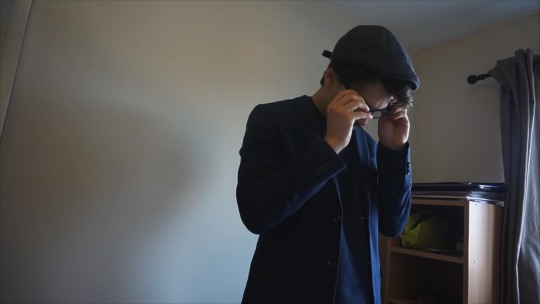
Example of medium shot from <Ripped>
Another technique which was very significantly used in my film influenced by my TA is low key lighting. During the second half of the film, the overall mood totally changes and it gets way darker than the first half. Even the genre seems to change after the bridge, from drama to thriller and I thought that the best way, also the most basic way to present the mood changing visually was to dim the light which was used in the chosen sequence of <The Spectacular Now> as well.
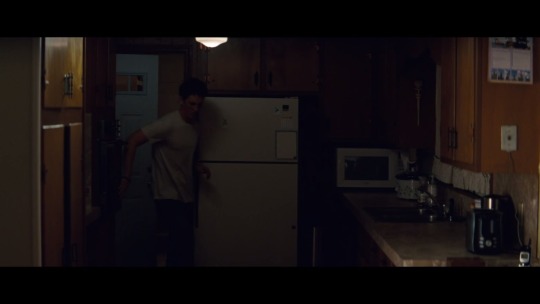
Example of low key lighting from <The Spectacular Now>

Example of low key lighting from <Ripped>
The last aspect of cinematography influenced by my TA is half face shadow. It is very commonly used when the character is struggling with an inner conflict and having a hard time in his mind. In the relevant scene from my short film, the protagonist is being mentally unstable at the moment and lost himself between his original personality and the hyperemotional one.Therefore I thought the half face shadow could successfully reveal his hidden instability as he is a type of character who never shows his inside.
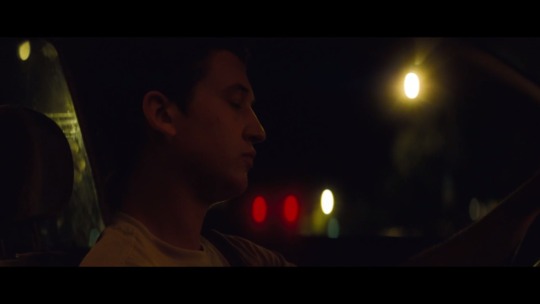
Example of half face shadow from <The Spectacular Now>

Example of half face shadow from <Ripped>
Mise en scene
Just as I did in cinematographic aspect, I mainly aspired to get only basic ideas from my TA for the Mise en scene as well. One thing I derived from <The Fault in Our Star> was how to use costume in a way to explain the character’s mental and social status. While in the chosen sequence of <The Fault in Our Star> Hazel wears hoody, jacket and jeans and Augustus wears sweat shirt and sweat pants which tells that how vulnerable Augustus got both mentally, physically and socially compared to Hazel, in <Ripped> the protagonist wears a costume of jacket, dress slacks and hat which obviously shows stiffness and formality of his personality, also that he is originally from quite wealthy background. It is quite significant indicator as Julian is a character who had been exposed to domestic violence for a long period of time but couldn’t get away by accusing it as he shouldn’t disgraced on his family. And the fact that he still wears what he used to wear presents that he is still under the control of his past memories and traumas.
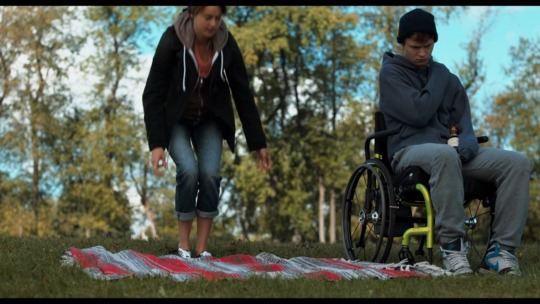
Example of the use of costume from <The Fault in Our Star>
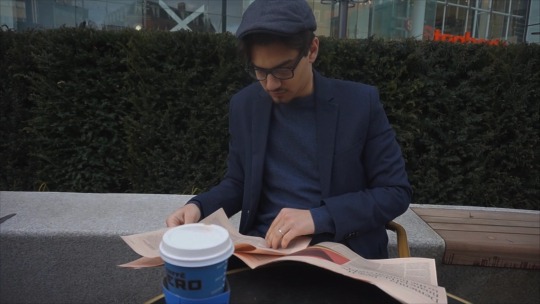
Example of the use of costume from <Ripped>
Sound
In both of the chosen sequences, soundtracks take a big part of indicating a change of the mood and tone of the scene. They both starts with background musics that clearly contain sad and gloomy atmosphere and ends with much more hopeful and delightful musics that change the mood brighter. In my short film, soundtrack is also used as a very important tool of tone changing. I chose quite relaxing but delicate and mournful song for the first half as Effie talks about the memories of her and Julian in a nostalgic way. For the second half, I inserted more heavy and majestic song to give the image of seriousness and more tension in the scene, so that it can be distinct from the former scenes.
Editing
I haven’t really used any kind of editing skill that is considerably stylistic or unique, it’s mainly just cuts as it’s the most basic way of editing and my TA sequences also use basic cuts between every shot. I think what makes my artefact different from the two sequences is a dissolve transition used consecutively in the middle of the film. The technique was very useful to make the scene look mysterious as the successive dissolved moments convey the image of a defective memory.
3. How were the planning materials used in the construction of the artefact?
The reason why I chose <The Fault in Our Star> and <The Spectacular Now> for my TA essay at the beginning was simply because they were the most touching coming of age films in my personal opinion. However after I watched them several times for the essay, I found out that the biggest common feature between them was that they are portraying teenagers in very honest and completely unrefined way. There are so many teen romance films out there and quite a lot of them is not that same with the reality. In these two films, teenagers are exhibited as very unstable, incomplete and fragile creature while they commonly get presented almost like adults in other films. The characters in those two films show us their negativity caused by things like short lifetime or lack of experiences and knowledge throughout the whole film and that makes teen audiences genuinely feel like it’s exactly what they are suffering from as well. I started to establish my planning based on that idea. I wanted to make a movie showing a problem that people don’t like to talk about or don’t recognize that easily but is still existing. That is how I came up with the subject of domestic abuse and teenager’s mental health issues caused by it.
In my case, the most important piece of planning when it came to the filming process was the audience feedback. This was the first time I made a film in my lifetime and therefore I was completely unsure about whether what I did was right or wrong. After I screened my rough edit version in the class so many helpful feedback telling me the points that I haven’t noticed at all and loads of them also lifted my confidence with such kind words. I think it was very significant process especially for students like me, who don’t have much experiences of film making.
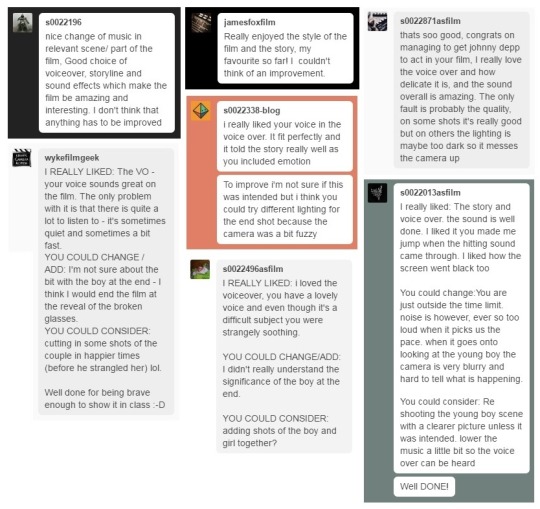
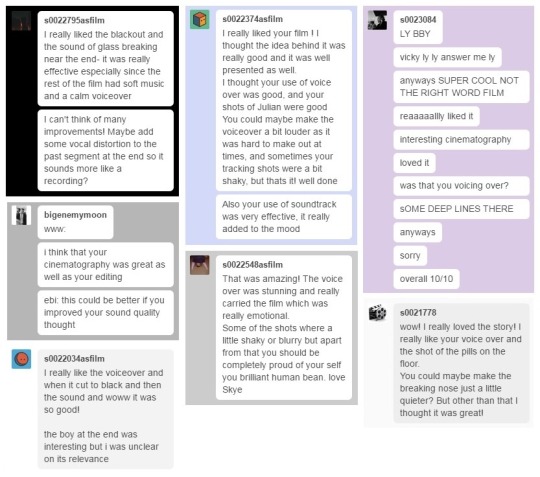
Audience feedback
I don’t specifically think I needed to do more planning to be honest, of course planning is important as it’s a foundation of the film but I don’t regret that I put much more time in actual filming and editing because my plans did change quite a lot after that. When I started planning of the film, I had so many ideas and thoughts that were practically not a possible options. It’s always so different from what you think it would be like when you actually try to put your thoughts into the practice. The first thing I had to modify was who I will have as actors of my film. At the beginning I had two of my friends who was meant to act a female protagonist and male protagonist but as the former one moved out to different place after the plan was made, so I decided to change the story line a bit rather than get a new actor because I thought the new story would fit the aim of my filming better anyway as I stated at Q1. Even after that, I had a number of modifications such as deleting a whole scene, changing locations, replacing props, delaying shooting schedule, and so on. Overall I’m quite satisfied with the final result I’ve got, but still think I can produce a better outcome if I get a chance to try it again next time.
4. How successful was the artefact in achieving the aims?
I can’t say that I’ve done 100% of what I wanted to do, but think the result seems to be better than my concern and is conveying the messages I wished to say quite obviously, both for my TA and the short film. Nevertheless, if you ask me whether I want to get a chance to start again completely or not, the answer would be definite yes. Since it was the first time ever I made a film, there were things that I forgot to care about although they really do matter to me, for instance the overall color tone match and the video quality. If I get a chance to start over, I would use a camera with a higher performance to shoot and edit more elaborately, putting more effort into color compensation. I also should’ve talked to my actor more about the character so that he could lend more probability to his acting. One of the things that I feel upset the most about my film is the deleted scene of young Julian. Since I had to delete it because of the time limit and video quality problem although it was a key scene directly exhibiting how Julian got dissociative identity disorder, I’m not entirely sure that all of the audience would understand the narrative clearly without it. The young actor who played the role was such a brilliant kid and I genuinely think it could’ve gone really well if I had enough time to reshoot the scene a couple more times.
0 notes